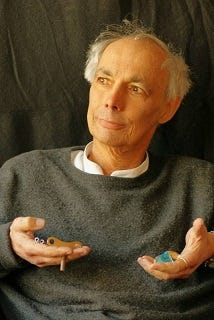Introduction
I learned about the works of Fravia in the netstalking community, which grew up in the early 2010s as a bizarre mixture of young network seekers, explorers of the depths and secrets of the Internet, and bored mature techno-geeks with skills in software development and information security.
His most famous work is the Searchlores.org website. It not only was, but remains a treasure for people interested in Search Art, and it’s a big loss that Fravia is not remembered that often now. I consider his thoughts fundamental and am still amazed that people frequently reinvent some methods and tricks without sincerely trying to find out if anyone has done it before them. But no less important is that the world stopped discussing the philosophy underlying the Search because the search process had become too casual and commercialized.
The book
The original site was lost. On the one hand, Fravia's site still has many mirrors and was deliberately designed as a labyrinth of interconnected web pages that force you to learn to search. On the other hand, times have changed, and valuable information should be published in more modern and accessible mediums to prevent it from being lost in the dusty archives of collective memory.
That's why I teamed up with people who collected his best writings several years ago, adapted them, and compiled them into a PDF. We have recompiled this book, adapted it for a wide audience, added sources and mirrors, and proofread it. We fit everything into 50 pages, but inquisitive readers can always refer to any of Searchlores.org's mirrors!
I hope that this book will be like a treasure map for anyone who wants to get better at finding stuff online. It teaches you the tricks of looking up information the smart way, so you don't get lost or tricked by the unnecessary clutter out there. It's not about using tools; it's about thinking and analyzing what you see and read. The later chapters take you deeper, showing how to see through the fog of misleading ads and biased articles, and even how to decode propaganda, making the internet a less confusing and more truthful place.
Biography
Francesco Vianello (August 30, 1952 – May 3, 2009) was a reverse engineer and hacker known as Fravia or +Fravia. He wrote articles, conducted lectures, and provided online education focused on reverse engineering techniques, steganography, and methods of searching on the Internet. And all this at a time when Google was not even known! In his lessons, he shared his experience of anonymity and de-anonymizing spammers, taught information elicitation, reversed the meaning of advertising, and explored ways to get rid of it.
He compiled all these materials on his website, creating a clever web archive full of tangled tracks and references to classical culture: music, painting, rhetoric, and Latin expressions. The site also includes articles and logs of discussions among like-minded individuals. During the author's lifetime, the online resource had millions of views each year.
Francesco was a polyglot and, by education, a historian of the early Middle Ages. He was a participant in the "High Cracking University", founded by the veteran reverser known as +ORC. As a mark of membership in this community, he added a plus sign to his nickname.
True to his principles of anonymity, Francesco strictly separated his online activities and identity from his real-life person. He even wrote a fake autobiography to protect himself from "malicious seekers". According to some posts and logs on the website, in the Usenet conference discussions within the seeker community, conflicts occasionally arose. In particular, Fravia managed to annoy many spammers by teaching people how to uncover their tricks.
As the internet grew and evolved into a crucial tool for accessing information, Fravia believed that this access should be more open. The idea of network search, "search art", became the foundation for his second stage of online activity. He explained how the content of the World Wide Web was structured at that time and how to overcome difficulties in finding relevant information. He vehemently criticized the rapid growth of internet advertising, which he considered the peddling of unnecessary products to naive consumers.
If you find an error or want to suggest an improvement, please report, and it will be corrected/added in the next revision of this book.
Enjoy your reading!





